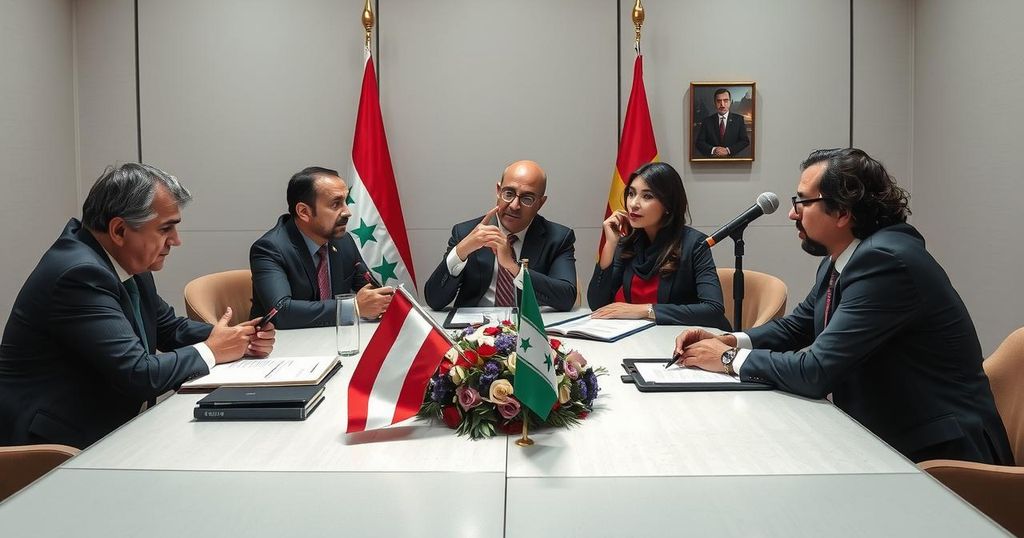Global news
AFRICA, ANADOLU AGENCY, ASIA, CONFLICT RESOLUTION, DAMASCUS, DIPLOMACY, EGYPT, ERDOGAN, EUROPE/ASIA, FIGHTER JETS, JAMOUS, KURDISH PEOPLE ’ S PROTECTION UNITS, MICHAEL ONMACHT, MILITARY ACTIONS, QATAR, RUSSIA, SECURITY COUNCIL, SHEIKH TAMIM BIN HAMAD AL THANI, SYRIA, SYRIAN CIVIL WAR, SYRIAN CONFLICT, SYRIAN DEMOCRATIC FORCES, TURKEY, VA
Fatima Khan
0 Comments
Key Leaders Discuss Syria’s Future: Unity, Reconstruction, and Political Transition
Egyptian President Abdel Fattah Al-Sisi has stressed the importance of preserving Syria’s unity, while Turkey’s President Erdoğan advocates for international collaboration in reconstruction efforts. Syrian opposition leader Bader Jamous calls for transitional justice and an inclusive national conference to establish a new government. Concurrently, Russia and UN officials highlight the dire humanitarian crisis affecting over 70% of the Syrian population, as France reengages diplomatically after a prolonged absence.
Egyptian President Abdel Fattah Al-Sisi has recently underscored the critical need to safeguard Syria’s unity and territorial integrity. In a conversation with Cypriot President Nikos Christodoulides, Al-Sisi highlighted the importance of launching an inclusive political process that encompasses all factions of the Syrian population. On a parallel note, Turkish President Recep Tayyip Erdoğan has called for enhanced international collaboration for Syria’s reconstruction post-conflict, while reiterating Turkey’s commitment to combating terrorist organizations threatening its security.
The Syrian opposition voices, represented by Bader Jamous, the head of the Syrian Negotiation Commission, have articulated the necessity of pursuing transitional justice in Syria. Jamous reaffirmed that dealing with the previous regime and the actions of President Bashar Al-Assad is essential and called for the establishment of a national transitional government reflecting the diverse segments of Syrian society. He further recommended organizing free and fair elections under United Nations supervision following a constitutional referendum.
In discussions with key international bodies, Russian envoy Vasily Nebenzya insisted on the importance of maintaining Syrian state institutions. He urged the lifting of sanctions to facilitate recovery efforts. UN Special Envoy Geir Pedersen noted the significance of a political transition for garnering essential economic support for Syria, emphasizing the urgent requirements amid a humanitarian crisis that has left over 70% of the population in dire need of assistance.
Additionally, France has re-engaged diplomatically with Syria, sending a team to validate the prevailing political conditions and pressing for an inclusive political approach from local authorities. The recent decision to raise the French flag over its embassy in Damascus, after a long closure, marks a noteworthy gesture towards redefining relations, although France maintains that any political transition must align with the United Nations framework.
The ongoing conflict in Syria has resulted in significant geopolitical ramifications, engendering varied stances from regional powers. The international community remains pivotal in shaping Syria’s future, particularly with regard to fostering political stability and facilitating humanitarian aid. Various actors, including Egypt, Turkey, Russia, France, and the UN, continue to interact with the underlying situation, advocating for frameworks that promote unity and effective governance in the war-torn nation. The issues of transitional justice and political representation are paramount as the Syrian populace seeks a resolution to years of strife.
In summary, the dialogue surrounding Syria’s future encompasses multiple stakeholders advocating for a unified and inclusive approach to governance. President Al-Sisi’s emphasis on unity, Erdoğan’s calls for reconstruction, and Jamous’s insistence on transitional justice illustrate the complexities of the situation. The international community’s roles, defensively and constructively, remain crucial in addressing humanitarian needs and enhancing political transition efforts in Syria, with a concerted focus on collaboration and comprehensive engagement.
Original Source: www.dailynewsegypt.com




Post Comment